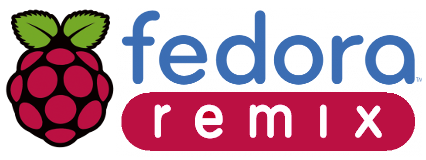Difference between revisions of "Raspberry Pi Fedora Remix"
Chris Tyler (talk | contribs) (→Getting Help) |
Chris Tyler (talk | contribs) (→Reporting Bugs and Suggesting Enhancements) |
||
| Line 70: | Line 70: | ||
== Reporting Bugs and Suggesting Enhancements == | == Reporting Bugs and Suggesting Enhancements == | ||
| − | Your help in identifying bugs and suggesting enhancements is very important! | + | Your help in identifying bugs and suggesting enhancements is very important! Please file your bug report/enhancement request: |
| − | + | * for bugs related to Fedora packages: on the Fedora bugzilla system at http://bugzilla.redhat.com | |
| − | Please report bugs | + | * for bugs related to Raspberry Pi-specific packages, the installer, or the Remix: on the FedoraHosted ARM Trac system at https://fedorahosted.org/arm/ |
| − | |||
| − | |||
== Frequently Asked Questions (FAQ) == | == Frequently Asked Questions (FAQ) == | ||
Please refer to the [[Raspberry Pi Fedora Remix FAQ]]. | Please refer to the [[Raspberry Pi Fedora Remix FAQ]]. | ||
Revision as of 23:07, 8 March 2012

The Raspberry Pi Fedora Remix is a Linux software distribution for the Raspberry Pi computer. It contains software packages from the Fedora Project (specifically, the Fedora ARM secondary architecture project), packages which have been specifically written for or modified for the Raspberry Pi, and proprietary software provided by the Raspberry Pi Foundation for device access.
Contents
- 1 Remix Releases
- 2 Obtaining and Installing the Raspberry Pi Fedora Remix
- 3 Setting Up the Raspberry Pi for First Time Use
- 4 First Boot
- 5 System Administration: Managing the Raspberry Pi Fedora Remix
- 6 Helping with the Remix
- 7 Getting Help
- 8 Reporting Bugs and Suggesting Enhancements
- 9 Frequently Asked Questions (FAQ)
Remix Releases
Currently available:
In preparation:
Obtaining and Installing the Raspberry Pi Fedora Remix
Refer to Raspberry Pi Fedora Remix Installation for instructions on preparing an SD card containing the Remix software.
Setting Up the Raspberry Pi for First Time Use
This is the recommended system configuration for first time startup:
- Connect the Raspberry Pi to a high-definition monitor or TV using the HDMI output (HDMI and DVI-D are basically the same signals, so an HDMI-DVI adapter can be used).
- Connect a USB keyboard (and, optionally, a USB mouse).
- Plug in an ethernet cable connected to an IPv4 network with a DHCP server and Internet gateway. The Remix will use this connection to set the system clock.
- Insert the SD card.
- Apply power.
First Boot
During the first boot of the system, two processes take place:
- the image is resized to fill the SD card.
- if the system is being used interactively, the user is prompted to do final system configuration (set the root password, create a user account, set the timezone, and select character-mode or graphical default operation).
These processes are managed by the Raspberry Pi Init Scripts.
System Administration: Managing the Raspberry Pi Fedora Remix
The Raspberry Pi Fedora Remix is administered using standard Linux system administration procedures. For specific tips, see:
- Raspberry Pi Fedora Remix Administration
- (Add resources here!)
Helping with the Remix
The Remix is based on Fedora ARM. If you're interested in improving the Remix, please consider participating in the Fedora project. The Fedora community is very welcoming, and there are instructions on the Fedora web site on how to join and participate in Fedora, whether as a software developer and packager, translator, documentation writer, artist, designer, ambassador, or teacher.
The Remix was produced at the Seneca Centre for Development of Open Technology, which hosts the Fedora ARM build system.
To learn why this is a Remix and not a direct Fedora release, please see the FAQ.
Getting Help
There are many sources of help available:
- The Raspberry Pi Community
- Web site and forums: http://raspberrypi.org
- Wiki: http://elinux.org/RaspberryPiBoard
- IRC: irc://irc.freenode.net/raspberrypi
- The Fedora Community
- Web site: http://fedoraproject.org
- Wiki: http://fedoraproject.org/wiki
- Mailing lists:
- General discussion: https://admin.fedoraproject.org/mailman/listinfo/users
- Fedora-ARM: https://lists.fedoraproject.org/mailman/listinfo/arm
- Developers and packagers: https://admin.fedoraproject.org/mailman/listinfo/devel
- IRC: irc://irc.freenode.net/fedora - irc://irc.freenode.net/fedora-arm
- Seneca Centre for Development of Open Technology
- Web site and wiki (this wiki!): http://cdot.senecac.on.ca
- IRC: irc://irc.freenode.net/seneca
Reporting Bugs and Suggesting Enhancements
Your help in identifying bugs and suggesting enhancements is very important! Please file your bug report/enhancement request:
- for bugs related to Fedora packages: on the Fedora bugzilla system at http://bugzilla.redhat.com
- for bugs related to Raspberry Pi-specific packages, the installer, or the Remix: on the FedoraHosted ARM Trac system at https://fedorahosted.org/arm/
Frequently Asked Questions (FAQ)
Please refer to the Raspberry Pi Fedora Remix FAQ.